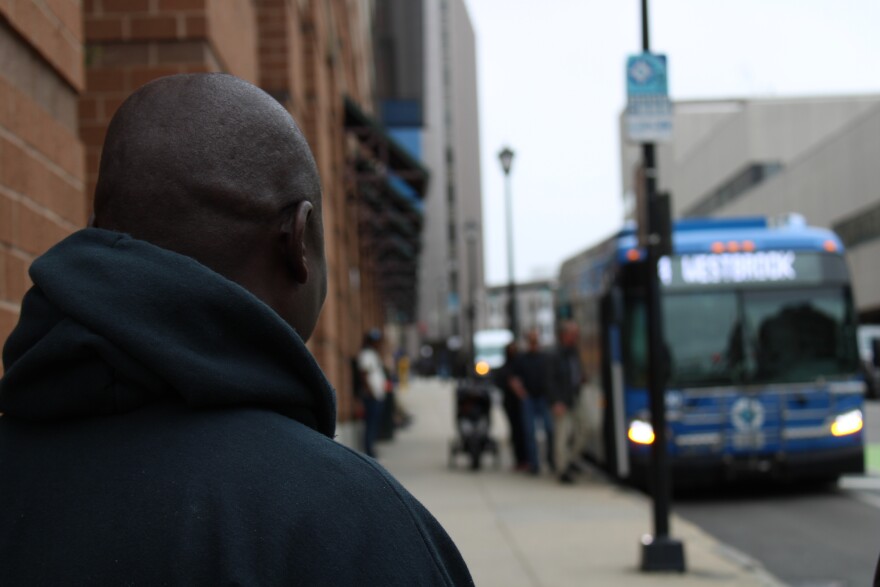Standing on a busy street corner in Portland as rain clouds roll in overhead on a recent morning, a man named Ambrosio was waiting for the public library to open so he could rest indoors for a little while.
Ambrosio is from Guinea-Bissau, a small country in West Africa. He said he worked in construction for nearly two decades before coming to the U.S. to seek asylum last year.
With city shelters at capacity, he said he has been living on the street for a little over a month. Speaking in Portuguese, he said he sleeps wherever he can find a place, sometimes staying in local churches.
But that could soon change. Ambrosio said he has found a one-bedroom apartment in South Portland. The landlord is willing to accept general assistance rental vouchers while he waits for his work permit.
Ambrosio is among thousands of asylum seekers who’ve arrived in Maine over the last several years. Ineligible for federal housing assistance such as Section 8 vouchers and, under federal law, unable to work until at least 180 days after they file their asylum cases, many have turned to general assistance to cover rent, food, and other necessities.
Cities that have taken in large numbers of asylum seekers, such as Portland, are seeing their GA programs grow significantly.
"We've had to increase our budget line with regard to general assistance, you know, by many millions of dollars over the last two years, two fiscal years," said interim city manager Danielle West. She estimates that asylum seekers account for 80-85% of GA recipients in the city.
In neighboring South Portland, where asylum seekers account for roughly 60% of recipients, the GA budget is up 407% compared with fiscal year 2019.
GA is administered at the local level, and the state reimburses municipalities for 70% of the benefits cost. West said Portland has also received extra reimbursement from the Federal Emergency Management Agency during the pandemic.
But that extra money is set to run out this month. To avoid what she calls a funding cliff, West is urging lawmakers to pass a bill currently in the legislature that would bump up the state’s share of GA costs to 90%.
"So we're really looking for the Legislature to help us with that funding piece," she said. "Because I don't think it's sustainable, especially not for the city of Portland, to continue to fund at the level we've been funding."
That bill is currently before the legislature’s Health and Human Services committee, which will take public testimony on a slate of proposed GA reforms on Friday.

State officials say there are a number of factors driving higher GA costs, including the end of pandemic-era relief programs and the state's ongoing affordable housing crisis.
Harrison Deah, who administers Westbrook’s GA program and serves as the president of the Maine Welfare Directors Association, said the financial and administrative burden is particularly acute in cities that are hosting large numbers of asylum seekers.
But Deah said supporting new immigrants while they wait for their work permits should be seen as an investment in the state’s economic future, in the face of an aging population and a shrinking workforce.
"Because these folks are coming in, they're gonna contribute at a certain point, when they're able to," Deah said. "They're going to be able to work, they're going to be able to pay taxes, they're going to be able to do all of those things, and it's going to benefit the entire state."
In Portland, West expressed a similar perspective.
But some lawmakers say the state’s GA program is too generous. State Sen. Eric Brakey, R-Androscoggin, who sits on the health and human services committee, has introduced bills that, among other things, would create a 180-day state residency requirement to receive GA benefits.
"The goal here is to make sure that our general assistance program is catching people who fall on hard times and need a helping hand who are longtime residents of the state," he said.
In 2015, the Maine :egislature passed a law with bipartisan support allowing most noncitizens to access GA. But former Gov. Paul LePage tried to restrict eligibility under that law, barring many immigrants from receiving benefits.
In 2019, Gov. Janet Mills reversed those measures, allowing most asylum seekers to get GA. That move was partly intended to provide relief to municipalities as hundreds of asylum seekers were arriving in Portland that summer.
Now, though, Brakey said that relief has become a magnet.
"Resources are stretched to the limit in places like Portland, and the GA program and this ability for people to get here on Day One and sign up for GA benefits, this has been a driving factor in that," he said.
But immigration advocates said those rule changes would have serious consequences for new arrivals.
"For those bills that would be more restrictive, they would be catastrophic to the asylum seeker community," said Tobin Williamson, advocacy manager with the Maine Immigrants' Rights Coalition. In particular, he said residency requirements would put asylum seekers in a bind while they wait for work authorization.
"And so it would be just really problematic if people are not able to get any sort of assistance while they are legally prohibited from working at the federal level," he said.
Meanwhile, Ambrosio, the man from Guinea-Bissau, said he’s thankful for GA, because it’s his only option for paying rent and getting off the street while he waits for his work permit.
And he’s optimistic about the apartment he found in South Portland. He said all that’s left to do is get squared away with the city’s GA office.
"If they pay today," he said, "Tomorrow I’ll be in my house, God willing."



